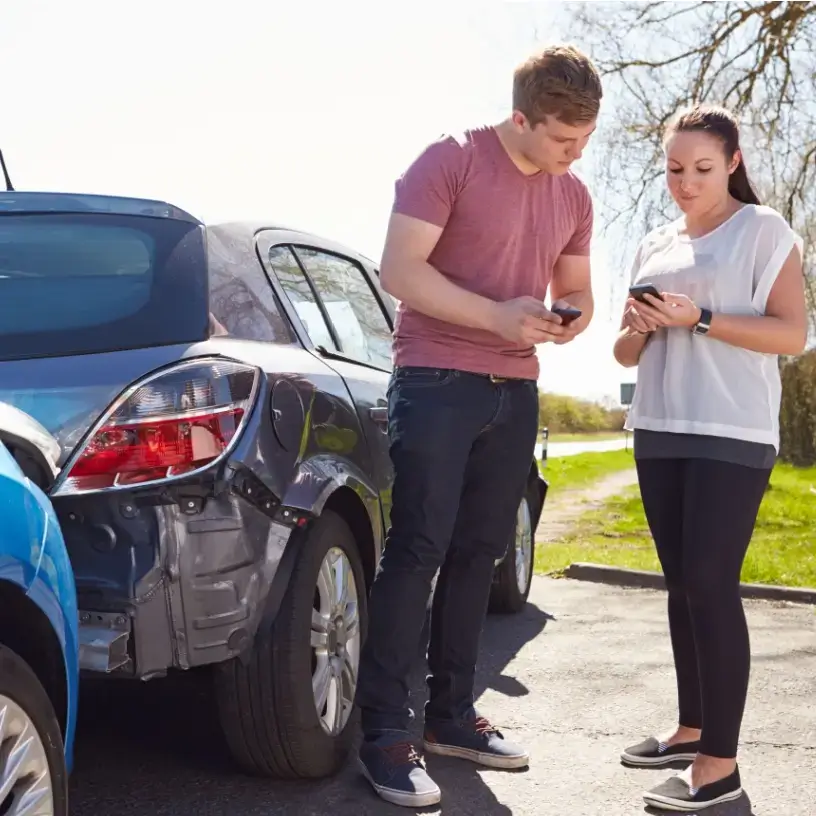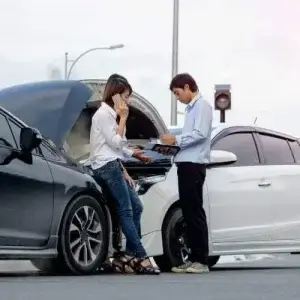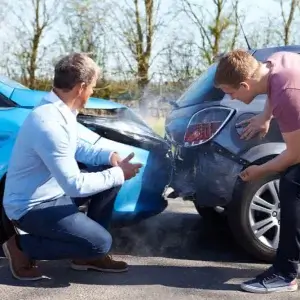Home / Compare Car Insurance / What to do if you’re inv…
What to do if you’re involved in a not-at-fault car accident without insurance



Key takeaways
Dealing with the aftermath of a not-at-fault car accident can be difficult even if you have car insurance, but it can be even more so if you don’t. Our guide can help you understand what to do if you’ve been in a not-at-fault car accident without insurance, including these key points to remember:
- Make sure you gather identifying information and contact details of the at-fault driver.
- Record as many details about the incident as you can, as this can help authorities and insurers determine who was at fault.
- Even if the at-fault driver is also uninsured, they’re still responsible for the costs of the damages to your vehicle and property.
What to do after a not-at-fault car accident without insurance: Tips from our car insurance expert, Adrian Taylor

Gather as much detail as you can from the other party involved
Make sure you take the time to gather all the necessary details from the at-fault party immediately after the accident. This includes the other person’s licence number, registration number, car information, contact details and if you can, their insurance details.
Get a quote on repairs as soon as you can
Get the jump on the other party responsible (or their insurer if they have one) by getting a repair quote as soon as you can after the accident to avoid disputes.
Make sure you’re satisfied with any repairs carried out
If you’re not satisfied with the repairs after your car has been returned to you, make sure you go back to the repairer immediately. This may reduce or avoid any further disputes.
Consider a comprehensive policy to cover your car
In case of future incidents, you may want to consider getting comprehensive car insurance. This type of insurance may not only cover the damages to both your vehicle and another driver regardless of who’s at fault for an accident, you’ll also be covered for a wide range of other events like fires, storms and theft.
How do I get compensated if I’m not at fault for an accident and don’t have insurance?
 If you’ve had a not-at-fault car accident without insurance, your main point of contact is the driver who caused the accident, and you’ll need to go through them for the cost of repairs to your car. They can either compensate you through their insurance company or pay you directly.
If you’ve had a not-at-fault car accident without insurance, your main point of contact is the driver who caused the accident, and you’ll need to go through them for the cost of repairs to your car. They can either compensate you through their insurance company or pay you directly.
It’s entirely up to the other driver which option they choose to proceed with, but they are legally required to cover associated car costs if they’re at fault. If they claim through their insurance, their insurer should usually contact you for further details and to inspect your car as part of their process investigations.
If the at-fault driver refuses to pay, you could send them a letter of demand requesting them to contact their insurer or pay for the damage caused.
- The date, time and location where the incident took place
- The amount they must pay for the damage they caused
- Any other costs you’re claiming as a direct result of the accident
- When the money should be paid
- How you should receive the funds
- What happens if they don’t pay (i.e. legal action).
You’ll usually be required to obtain a quote for repairs to ensure the amount you’re asking for is correct. If the at-fault driver refuses to pay this money or respond to your request, you may wish to seek legal advice.
What details should I take when I’m involved in a not-at-fault accident without insurance?
At a minimum, you should exchange details with the at-fault driver; take the driver’s name, address, phone number, licence details and vehicle registration number. The more information you can provide about the crash, the better your chances of getting compensated.
Some other details you should consider recording include:
- A record of exactly what happened. It’s best to write this down as soon as you can after the accident, even if you jot it down on your phone. Make sure you note the date and time of the incident, as well as where it occurred.
- Witness statements from the scene. Did anyone else witness the accident? Get their contact details or ask them to send you a description of what they saw. It’s also worth checking if anyone captured the accident on their dashcams.
- Photos and videos. As well as damage to your vehicle, take photographs and video footage of the accident scene. It’s better to take these photos before you move your car from the scene.
- Police reports. Usually, the police only need be involved if there’s an injury or loss of life, damage to public property, the crash is a result of criminal activity or the incident causes a traffic hazard. However, you can also contact the police if the other party involved in the crash refuses to supply their details.
Important to know
How is a driver deemed at fault for an accident?
 While more than one person can be responsible for a motor vehicle accident, a driver may be considered at fault if:
While more than one person can be responsible for a motor vehicle accident, a driver may be considered at fault if:
- They’re driving under the influence of drugs or alcohol
- They rear-end the vehicle in front of them
- They don’t follow road rules, such as giving way, driving the speed limit, stopping at stop signs or following traffic light signals
- They admit to causing the accident.
Keep in mind that even if you’re technically not at fault, claiming responsibility for the accident at the scene could lead to you paying for the damages.
Can I claim my car’s damage on the at-fault driver’s insurance?
You cannot claim through another driver’s insurance company. The at-fault driver would need to lodge a car insurance claim through their insurance to begin the process of compensation for the damages they caused to your vehicle.
What happens in a car accident if no one has insurance?
If another driver causes an accident and neither of you has relevant car insurance, remember that they’re still required to pay for the damage they’ve caused to your vehicle.
The other driver may be reluctant to pay or admit they’re at fault, which is why gathering evidence is crucial in getting your car repaired. In these instances, you may want to seek legal advice as to how to proceed following an accident with an uninsured driver.
Not-at-fault accidents and car insurance
Do not-at-fault accidents affect insurance if I take out a policy afterwards?
The premiums you pay for your car insurance will likely be affected by your past accidents (whether they’re at fault or not). Your accident history usually carries over when taking out a new car insurance policy, as your driving history may be of interest when insurers are assessing your risk as a driver and calculating your premiums.
It’s important that you’re honest and upfront with your insurance provider when taking out a new policy or updating one, and a previous car accident is something you may need to mention to your insurer. You also can’t make a car insurance claim for any damage or incidents that happened before you took out the policy with your current insurer.
If the at-fault driver pays anyway, why do I need insurance?
Generally, the most fundamental reason for purchasing car insurance is to cover you in the event that you are the at-fault driver and cause damage to another person’s vehicle or property. As you would be liable for these damages, it’s a good idea to at least have a third-party insurance policy in place to cover your liability for the damage costs.
On the other hand, while at-fault drivers are required to pay if they cause damage in an accident, the at-fault drivers themselves may not be insured and unable to pay for the damage they’ve caused, which can complicate the process. In these cases, having your own car insurance policy can ensure that your car may still be repaired if the at-fault driver can’t pay the costs.
What type of car insurance should I take out?
Taking out comprehensive car insurance is an option if you’re concerned about future accidents and how to pay for the damages. As well as covering damage you may cause to other vehicles, comprehensive insurance covers damages to your car regardless of who’s at fault.
There’s also the peace of mind you get with knowing that your car will also be covered for damage caused by storms, hail, theft, fires and more.
However, if you’re not looking for top-notch cover, Third Party Fire and Theft insurance can cover your liability for the damages you cause to another vehicle in an accident; your own car is also covered if it’s damaged by fire or stolen. Third Party Property Damage policies cover the damage to other people’s vehicles as well as their property if you cause an accident, but it may not cover your vehicle.
Compulsory Third Party (CTP) insurance, which all cars are legally required to have to drive on Australian roads, covers you if you injure or kill someone while behind the wheel.
You should always check the relevant Product Disclosure Statement (PDS) from any provider prior to taking out any insurance policy, as this will outline the inclusions, exclusions and benefits. You should also read over the Target Market Determination (TMD) to be sure the product is right for you.
Meet our car insurance expert, Adrian Taylor
As a General Insurance expert with over 13 years’ experience in financial services, Adrian Taylor is passionate about demystifying car insurance for consumers, so they have a better understanding of what they’re covered for. Adrian’s goal is to make more information available from more insurers, to make it easier to compare and save.
